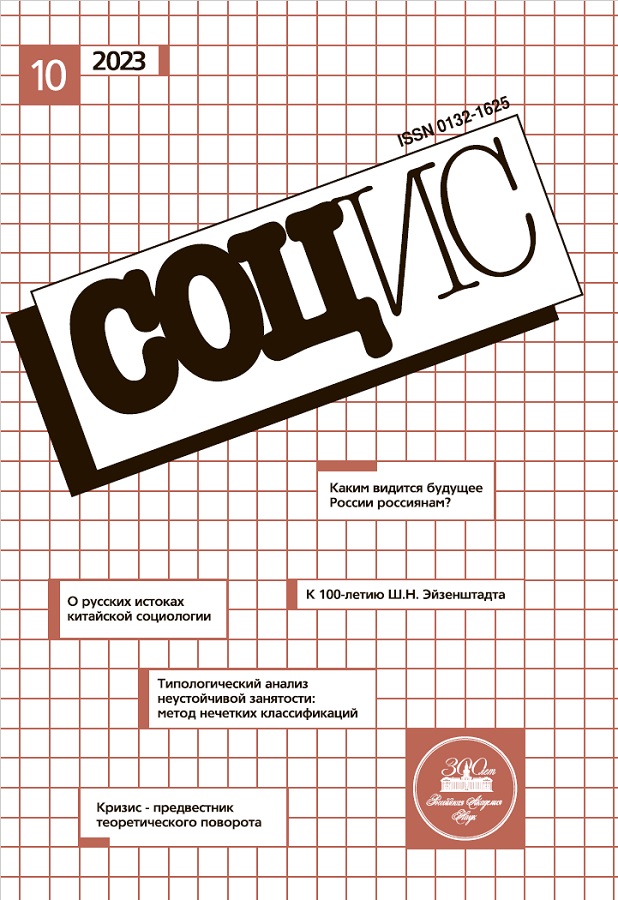The Perspective of Postsocial Transit: Metamorphosis of Actions and Structures
- 作者: Ignatyev V.I.1
-
隶属关系:
- Novosibirsk State Technical University
- 期: 编号 10 (2023)
- 页面: 3-13
- 栏目: Articles
- URL: https://cijournal.ru/0132-1625/article/view/661915
- DOI: https://doi.org/10.31857/S013216250028300-3
- ID: 661915
如何引用文章
详细
The hypothesis about the possibility of transformation society into a postsocial state is tested. The explication of the content of the concept of "sociality" is carried out. It is shown that the signs of intentions of the possibility of postsociality are present in the theory of symbolic interactionism and actor-network theory. The invariant of sociality is revealed. On the basis of the transdisciplinary approach, sociality is interpreted as a generic property of aggregations of homogeneous and heterogeneous agents of natural and hybrid origin to reproduce coordinated interactions. It is suggested that the potential for overcoming sociality is due to the transformation of the "action-structure" relationship, where the virtual actor becomes the agent of action, and the technosystem takes on the function of the structure. As a result, sociality is eliminated and tends to be preserved in the form of virtual epiphenomena, and social life proceeds outside of direct contacts between agents.
参考
- Арчер М. Реализм и морфогенез // Социологический журнал. 1994. № 4. С. 50–68.
- Белоногов И.Н. Ризома: по ту сторону сетей и иерархий // Вопросы философии. 2023. № 6. С. 91–94.
- Бергер П., Лукман Т. Социальное конструирование реальности. Трактат по социологии знания. М.: Медиум, 1995.
- Блумер Г. Символический интеракционизм: перспектива и метод. М.: Элементарные формы, 2017.
- Донати П. Реляционная теория общества: социальная жизнь с точки зрения критического реализма. М.: ПСТГУ, 2019.
- Дюркгейм Э. Социология. Ее предмет, метод, предназначение. М.: Канон, 1995.
- Игнатьев В.И. И грядет “другой” актор… Становление техносубъекта в контексте движения к технологической сингулярности // Социология науки и технологий. 2019. Т. 10. № 1. С. 64–78.
- Игнатьев В.И. Морфогенез гибридного социума: онтологизация цифры. Новосибирск: НГТУ, 2023.
- Игнатьев В.И. Объект социологии в метаморфозе морфогенеза гибридного социума // Социологические исследования. 2022. № 4. С. 114–124.
- Кнорр-Цетина К., Брюггер У. Рынок как объект привязанности: Исследование постсоциальных отношений на финансовых рынках // Западная экономическая социология: Хрестоматия современной классики. М.: РОССПЭН, 2004. С. 445–468.
- Кравченко С.А. Амбивалентности цифровизации: востребованность ее национально-культурной модели для устойчивого развития // Социологические исследования. 2022. № 9. С. 20–37.
- Латур Б. Пересборка социального: введение в акторно-сетевую теорию. М.: ВШЭ, 2014.
- Лешкевич Т.Г. Человек-виртуал и передача культурных ценностей эпохи цифры // Вопросы философии. 2022. № 3. С. 53–63.
- Луман Н. Общество как социальная система. М.: Логос, 2004.
- Морено Я.А. Социометрия: Экспериментальный метод и наука об обществе. М.: Академ. Проект, 2001.
- Плюснин Ю.М. Проблема биосоциальной эволюции: Теоретико-методологический анализ. Новосибирск: Наука (Сиб. отд-ние), 1990.
- Радаев В.В. Экспансия платформ как вызов социологии // Социологические исследования. 2022. № 12. С. 15–28.
- Резаев А.В., Стариков В.С., Трегубова Н.Д. Социология в эпоху “искусственной социальности”: поиск новых оснований // Социологические исследования. 2022. № 2. С. 3–12.
- Сорокин П.С. Проблема “агентности” через призму новой реальности: состояние и направления развития // Социологические исследования. 2023. № 3. С. 103–114.
- Тард Г. Монадология и социология. Пермь: Гиле Пресс, 2016.
- Фетисов В.Я. Контуры диагноза для социологии // Социологические исследования. 2022. № 9. С. 14–28.
- Флигстин Н., Макадам Д. Теория полей. М.: ВШЭ, 2022.
- Чернавин Ю.А., Баринова Г.В. Человек в пространстве цифровой культуры // Вопросы философии. 2023. № 4. С. 29–39.
- Шмерлина И.А. Биологические грани социальности: Очерки о природных предпосылках социального поведения человека. М.: ЛИБРОКОМ, 2019.
- Шмерлина И.А. Социология социальных форм: пересборка теории. М.: ФНИСЦ РАН, 2022.
补充文件









